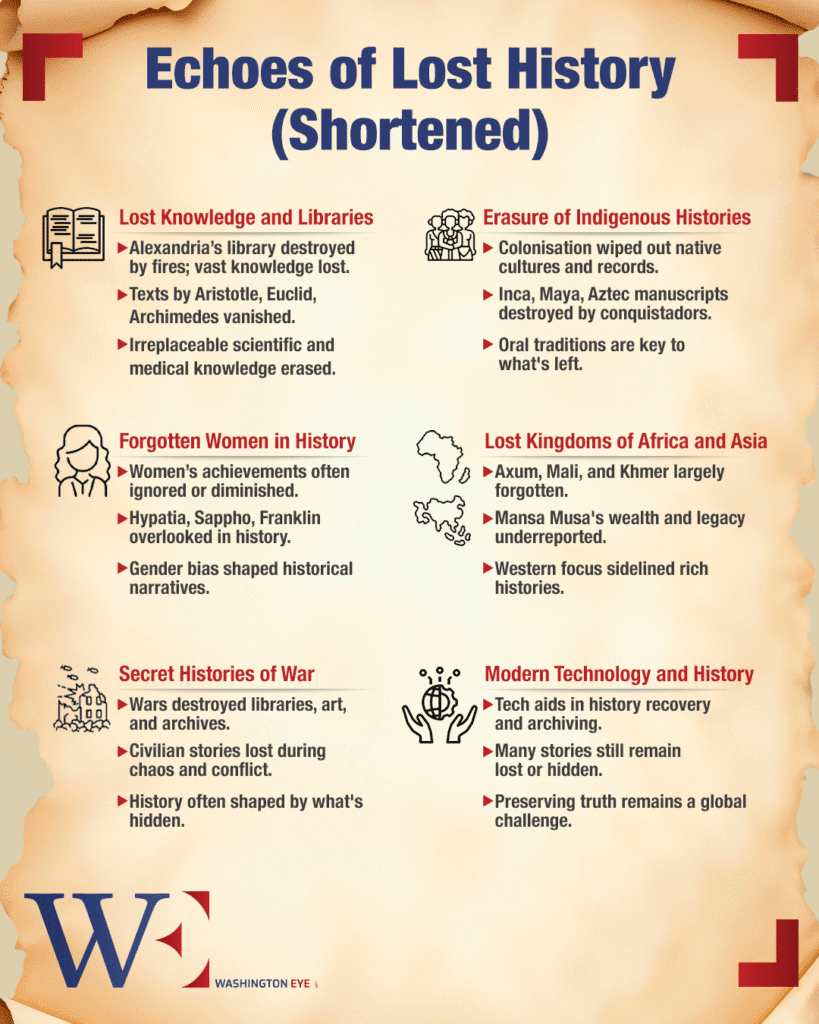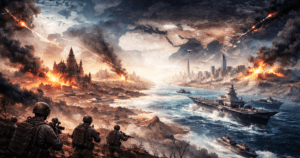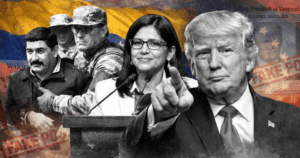History is a tapestry of events, figures, and moments that have shaped the present and future. Yet, for all the chronicles we’ve preserved, there is a vast and haunting expanse of history we have lost. These are the stories of civilizations, people, and events that have slipped through the cracks of time. They exist in fragments: buried in ancient ruins, obscured by wars, silenced by politics, or erased by forgetfulness. What remains is a gap—one that speaks volumes about what we don’t know, and perhaps, what we never will.
One of the most tragic losses in human history is the destruction of libraries that housed invaluable knowledge. Perhaps the most famous of these is the Library of Alexandria, one of the largest and most significant libraries of the ancient world. It was home to works from great thinkers such as Aristotle, Euclid, and Archimedes. Yet, over time, the library faced repeated attacks. It was ravaged by fires—first by Julius Caesar’s troops in 48 BCE, and later, by other invaders. In the end, the loss was not just physical; it was intellectual. The library held a treasure trove of ancient knowledge, from mathematical theories to medical treatises, all of which were lost to time. To this day, historians and archaeologists wonder how much more the ancient world could have offered if that knowledge had been preserved.
The Erasure of Indigenous Histories
In many parts of the world, the colonization of indigenous peoples resulted in the destruction and erasure of their history. When European explorers arrived on the shores of the Americas, Africa, and Asia, they brought with them not just trade and technology, but a destructive force that obliterated entire cultures. Indigenous peoples, with their own systems of governance, education, and philosophy, were systematically displaced. Their stories were marginalized, their languages suppressed, and their histories erased.
The destruction of the Incan, Mayan, and Aztec civilizations, for example, was not merely physical. The Spaniards, led by conquistadors such as Hernán Cortés, sought to eliminate indigenous cultures by burning manuscripts, statues, and temples. What little survived was often reinterpreted or rewritten to align with European ideologies. As a result, much of the pre-Columbian history of the Americas remains a mystery, with only a few pieces of evidence—ruins, artifacts, and oral traditions—left to tell their story.
The Forgotten Women of History
History, as it has been written, often ignores half of humanity: women. For centuries, the contributions of women were overshadowed by the achievements of men. Women in positions of power, creativity, and intellect were either dismissed or relegated to secondary roles. Figures like Hypatia, an ancient philosopher and mathematician, and Sappho, the poet from the Greek island of Lesbos, were relegated to the margins. Even the suffragette movements of the 19th and early 20th centuries were, for a long time, reduced to mere footnotes in historical accounts.
In many instances, women’s contributions to science, art, and social change were lost due to their gender. For example, the pioneering work of women like Rosalind Franklin in the discovery of DNA’s structure was largely overshadowed by the achievements of her male counterparts, James Watson and Francis Crick. Women in ancient societies who may have wielded power or shaped cultural narratives remain largely nameless and forgotten. This selective recording of history not only distorts the past but also diminishes our understanding of the complex, multifaceted role women have played in shaping the world.
The Lost Kingdoms of Africa and Asia
While the histories of ancient Greece, Rome, and Egypt are well-documented, the stories of many African and Asian kingdoms remain largely unknown to the global community. The Kingdom of Axum, located in modern-day Ethiopia, was a great civilization that flourished from the 4th to 7th centuries. Known for its architectural marvels, such as the famous stelae and its role as one of the earliest Christian kingdoms, Axum’s story has been largely forgotten outside of scholarly circles. The Mansa Musa of Mali, whose wealth was legendary and whose kingdom was a beacon of learning, remains little known to the wider world.
Similarly, the history of the Khmer Empire in Southeast Asia, whose Angkor Wat is one of the most magnificent religious monuments ever constructed, has often been overlooked in favor of Western-centric narratives of history. The fall of these empires and the erasure of their cultures by colonizers and later conquerors meant that much of their grandeur and achievements were lost to time.
The Secret Histories of War
War has not only been a force of destruction but also of concealment. Some of the most painful losses in history are those that are tied to conflict. The destruction of cultural heritage during wartime, whether by bombings, invasions, or purges, leaves a scar on human memory. The bombing of Dresden during World War II obliterated countless artworks and manuscripts, many of which were irreplaceable. Similarly, the looting and destruction of libraries and museums in Iraq during the Gulf War wiped out centuries of cultural history.
Perhaps the most haunting aspect of wartime history is the untold stories of individuals who lived through these dark periods. Diaries, letters, and oral histories sometimes survive, but often, they remain inaccessible, hidden in private collections or destroyed in the chaos of war. The stories of those who lived through the Holocaust, or the Rwandan genocide, for example, are scattered across the world, many of them forgotten as generations pass.
The Impact of Modern Technology on History
While we have lost so much of our past, technology has also played a role in preserving what remains. Advances in archaeology, digital archives, and historical preservation have allowed us to recover some of the lost pieces of history. Yet, the question remains: how many more stories have disappeared, buried beneath layers of time or intentionally obscured by those in power?
As we continue to explore new technologies and methods to uncover the hidden past, it is essential to remember that history is not just the sum of the events we can see, but also the ones we have lost. These lost histories are not just academic pursuits; they are critical to understanding the broader narrative of humanity’s journey. They remind us that our present is shaped by both what we know and what we’ve forgotten.
The history we lost is not simply gone—it is a silent testament to the fragility of time, the power of erasure, and the ongoing struggle to preserve the truths of our shared human past. Perhaps in seeking to uncover what has been lost, we might find new ways to learn, preserve, and honor the histories that continue to slip through our fingers.




















